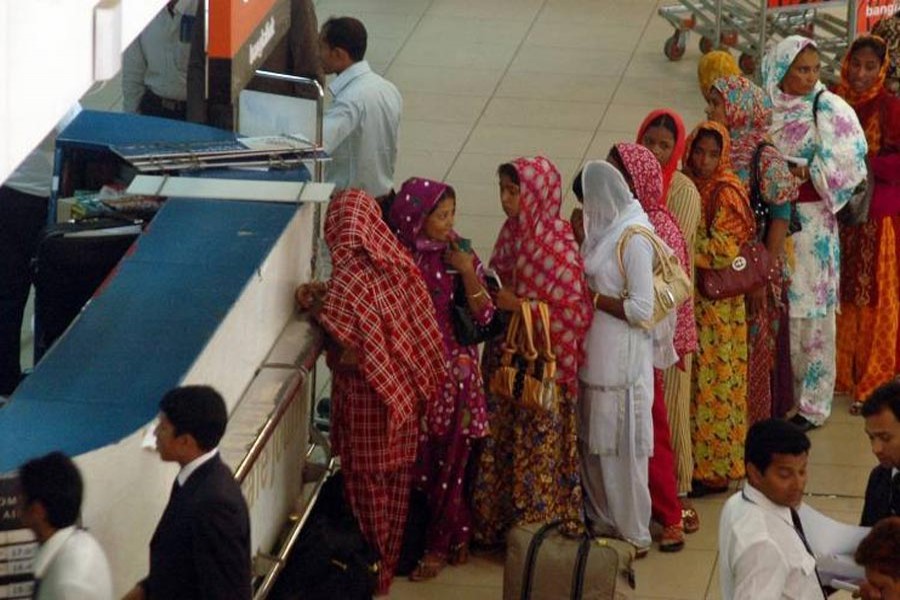Renu Begum (not real name) says it seems she has no right to lead a normal life back home on return from a Middle East country failing to do her job there defying all the workplace harassments.
Almost every day she is rebuked by her relatives and neighbours. As she has returned home empty-handed, her brothers cannot accept the fact that she will stay with them, she says.
"My life is now totally ruined. I don't know how I will live in my village," she says.
Like her, many women domestic helps back from Saudi Arabia and other countries are experiencing unbearable sufferings, burdened with loans and social stigma.
Many of them have been abandoned by their families. Many of them are separated or divorced. Health-related complications also are a common problem for them as they are yet to recover from illness and trauma that they experienced while working for their employers abroad.
Experts say the women returnees are badly in need of legal support and help for their social reintegration back home so that they can return to normal life. They say unless and until workplace protection is ensured, the government should not send any more women workers to any country.
Women workers faced maltreatment such as sexual, physical and psychological harassment and denial of wages at their workplaces in Middle East.
Bangladesh started sending women workers abroad in 1991. Since then, over 0.8 million women have gone abroad, mostly to the Middle East countries. About 90 per cent of them are recruited for housekeeping.
In recent months, a large number of the women workers returned home from Saudi Arabia after falling victim to abuses. Migrant rights campaigners and officials said more than 6,000 women returned home from the Arab country in last four years following exploitation. Of the total, about 1,500 women came back home from the Arab country in 2018. Nearly 500 came back in the last two months. Still more than 400 are at the safe home of the Bangladesh embassy there.
Sumaiya Islam, executive director at the Bangladesh Nari Sramik Kendra (BNSK) said currently they were recording too many cases in which employers stopped paying wages after two or three months. Whenever they demanded the dues, the employers tortured them.
It is very essential to do the follow-up on women's condition at least once in every three months. They have also been provided with a 24 hours hotline number for necessary communication, she says.
At least 20 women experienced severe psychological trauma and took treatment at the National Institute of Mental Health and Hospital (NIMH) on return home.
Jamila Begum (not real name) hails from Munshiganj. She said her employer hit her on the head, when she demanded wage.
She said she worked almost 20 hours a day. She was forced to work at three houses including the employer's own and his sister's and father's apartments.
"When I begged to rest, they beat me. Even they did not give me proper food and accommodation," Jamila added.
Besides, the employer's younger brother wanted to make sexual relationship. As she was very much exhausted, she escaped the house. But the police arrested her and filed a theft case as her employer lodged a complaint, she added.
However, the returnee workers are hardly getting legal support both at home and abroad. Though a significant number of women workers returned home from the oil-rich country, not a single case was filed against their employers.
Women are also not getting legal assistance at home properly. There is an arrangement of arbitration at the Bureau of Manpower, Employment and Training (BMET), but on maximum occasions it is very tough for a victim to get justice as it is mostly recruiters-friendly.
Shariful Islam, head of BRAC Migration Programme, said they received some 15 women suffering from psychological trauma last year. And this year, so far five to six such women have come to them.
It is very unfortunate that the authorities have yet to outline a proper reintegration programme for them. A large number of the women came home with multiple problems. Without any reintegration support, it is quite impossible for them to get back to normal life.
Mr. Islam also said there was no example of bringing any employer to justice for abuse of Bangladeshi women workers. If punishment was ensured, exploitation did not increase in such a way, he said.
Asst Prof Dr Farzana Rahman at the NIMH said they so far received a good number of women who returned from abroad with mental trauma.
The women lost their mental balance because of inhuman torture. In many cases, they could not explain what they faced at their workplaces due to the severe mental distress.
Sometimes long-term treatment is needed for them to return to normal life. Family and societal support is also vital for the women in such a crisis, Ms Rahman explains.
However, officials at the Ministry of Expatriates' Welfare and Overseas Employment said they had no reintegration scheme yet for the returnee women. They also did not believe that most of the returnee women were victims of abuse. On many occasions women concocted such stories of torture and exploitation for the sake of returning home, as they became homesick.
Aminul Islam, additional secretary of the ministry, said Bangladesh embassy had sufficient logistics and legal experts to address such legal issues.
But women did not want to file any case against their employers as they wanted to come back home quickly, he said.
"When a woman will lodge a case, she will not get a job. So, how will the woman stay in that country?" he posed a question.
Ovibashi Karmi Unnayan Program (OKUP) chair Shakirul Islam said at first, the authorities concerned needed to admit that the workers were exploited there.
Then they should bring the women under a psycho-social and financial reintegration programme. There was no way to deny the sufferings of the workers who were toiling for building the nation, he said.


